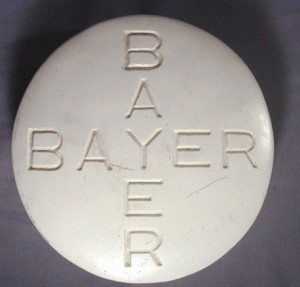 Two healthy food-based alternatives you can take to reduce heart attack and cancer risk naturally instead of daily aspirin.
Two healthy food-based alternatives you can take to reduce heart attack and cancer risk naturally instead of daily aspirin.
Recently, the NY Times discussed the latest recommendations from the United States Preventive Services Task Force. Published in the Annals of Internal Medicine for people aged 50-69, the daily dosage of aspirin reduces the risk of stroke, heart attacks, and even colorectal cancer. Aspirin, it is important to note does not prevent anything, but it statistically can reduce population risk. In other words, statistically, the studies show a benefit however your mileage may vary.
According to the NY Times article, “the evidence concluded that people in their 50s and 60s who have at least a 10 percent chance of having a heart attack or stroke over the next 10 years could benefit from daily low-dose aspirin. Those in their 60s are at greater risk for bleeds, which increases with age, so doctors should weigh risks and benefits in individual patients. There is no recommendation for aspirin use for people under 50 or for those 70 and older.” This basically means that if you have a greater risk for bleeding or gastric upset from aspirin, you should avoid taking it and the benefits do not outweigh the risks.
According to the National Cancer Institute, “In 2011, for example, a meta-analysis of eight randomized clinical trials that compared the risk of cancer death among participants who took daily aspirin for 4 years or more and those who took no aspirin found that, overall, aspirin use lowered the risk of dying from cancer by approximately 20 percent.” They also say that this information is relatively inconclusive but more definitive info is on the horizon.
According to Men’s Health, “Aspirin blocks an enzyme called cyclo-oxygenase-2, which halts the production of inflammatory substances called prostaglandins, says study author Andrew Chan, M.D., M.P.H. And blocking prostaglandins is important for your cancer risk, since they can promote the uncontrolled growth of cells in your gastrointestinal tract. That makes a cancer-causing mutation more likely to pop up.” Basically, they are recommending that we continue to have colonoscopies which while they are the gold standard, are not a good screen since it cannot be done efficiently in mass. They are a good diagnostic tool, however.
According to the patient page of the journal Circulation, “Aspirin reduces the risk of heart attacks and strokes by preventing blood clots from forming on the surface of ruptured atherosclerotic plaques. Atherosclerotic plaques build up along the lining of blood vessels over many years in response to injury caused by high blood pressure, abnormal blood sugar levels, high blood cholesterol levels, and toxins contained in tobacco smoke.”
While most drug companies who make aspirin are enjoying the endorsement and the sales that go with it, it is important to keep things in perspective. It seems that the effect of aspirin which is not a food is one of reducing inflammation and thinning the blood. The main side effects seem to be GI bleeding and stomach upset. Perhaps, the government should endorse the action and mechanism of the substance, and substances it recommends to achieve that result.
Two natural and healthier alternatives to aspirin to reduce your risk of cancer, heart attack and stroke.
1. Turmeric is a spice in Indian food. The main ingredient that works here is Curcumin. We have a supplement called Theracumin by Integrative Therapeutics which if taken daily is highly effective in reducing inflammation in the body, and is an effective natural blood thinner that can reduce the risk of circulatory problems. Also, because it is an effective anti-inflammatory agent, and inflammation is the largest cause of atherosclerosis, it is a better choice for the job than aspirin is. The government is likely not recommending it simply because it is not as highly researched, and it is not being championed by any business interest.
2. Fish oils and Omega 3s are great pain relievers and help reduce inflammation in the body as well, and unlike non-steroidal anti-inflammatory drugs, do not inhibit healing. There are many preparations of fish oils that are easily dosed on a caplet. Most health food stores carry products like these. Two to three caplets taken daily for a month will have a pain-reducing and anti-inflammatory effect on the body, which reduces the risk of heart attack, atherosclerosis and many cancers that thrive with inflammation that is exacerbated by sugars may have that effect reduced by the Omega 3’s.
The government-endorsed aspirin from studies of thousands of people taking it over time. The net effect of aspirin is it can reduce inflammation and the thin of the blood which appears to be the main mechanism of its benefits, yet, it also can cause gastrointestinal distress and is not food. Using our natural recommendations can not only have an effect that is safer and probably better than aspirin, but they are substances that will yield additional positive effects from the reduction of inflammation, without the inhibition of healing, something being considered as one of the major causes of many disease processes.